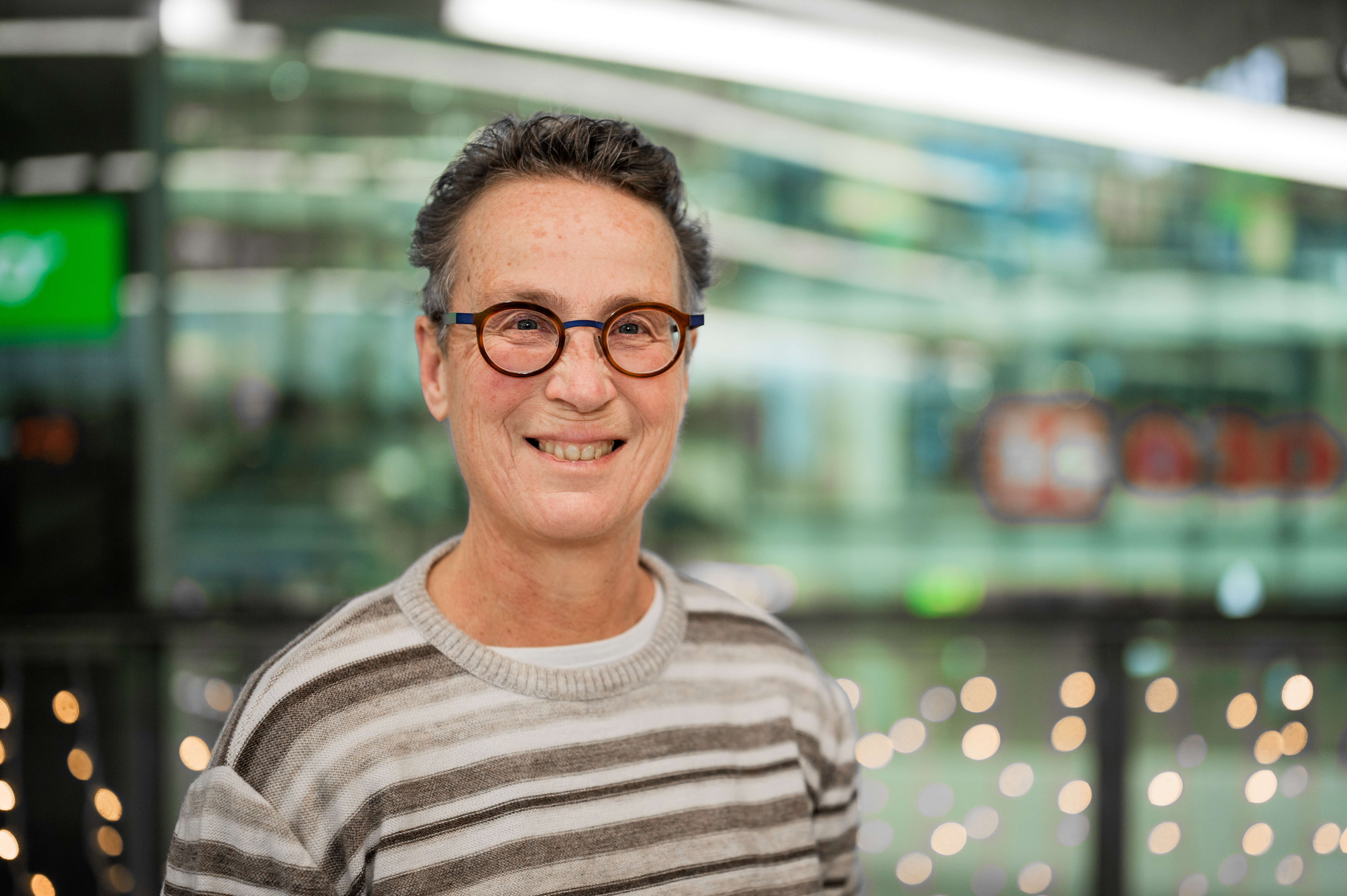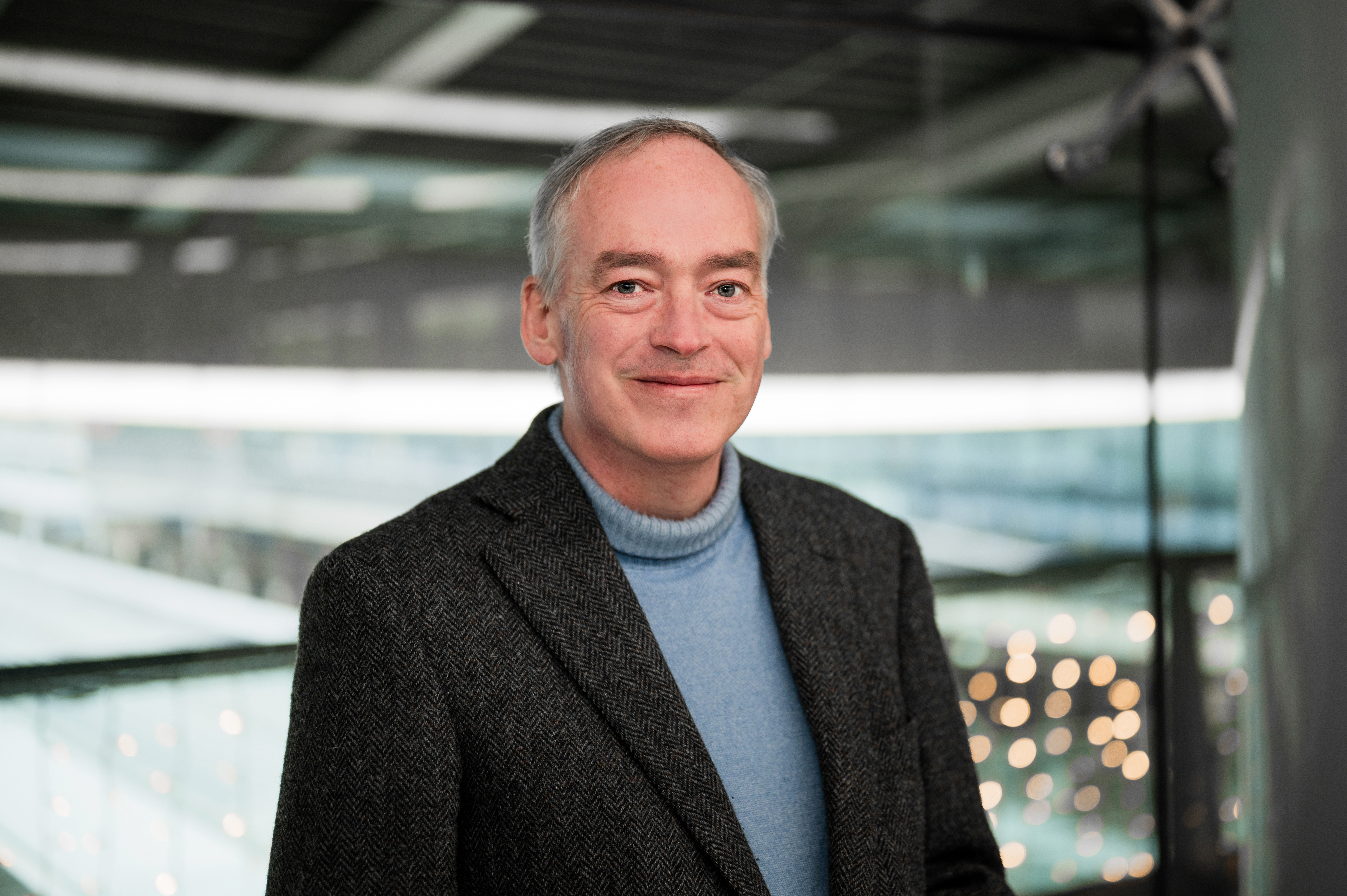Collaboration in person
One of the goals of Oncode Institute is to enable interdisciplinary research collaborations. To this end, Oncode launched a new initiative called ‘Oncode Accelerator Projects’ (OAPs) in 2021. The goal of OAPs is to form a multidisciplinary team that can uniquely address an unmet medical need or scientific challenge through innovative high risk-high reward approaches. The OAP initiated by Oncode Investigator Bas van Steensel of the Netherlands Cancer Institute is an inspiring example of the fruitful interdisciplinary collaboration that this may yield.
Impact story health
Patient perspective
Patients and researchers work together in Oncode Institute’s Patient Perspective Programme. For example, patients Carolien Hovenier and Theo Theunissen collaborate with Oncode researchers Michiel Vermeulen, Suzanne Weijers, and Geert Litjens.
Carolien Hovenier has been involved in Michiel Vermeulen’s research group since 2023. She decided to join because she felt she lacked knowledge about preclinical research. “I increasingly realised that effective treatments originate in the lab,” says Hovenier. “Not only the development of new drugs, but also improvements to medicines currently prescribed. I wanted to see if I could contribute to linking preclinical research to clinical research and vice versa.”
In Memoriam – Theo Theunissen
A kind soul with an original mind
We are saddened to share that Theo Theunissen, a valued member of our Patient Perspective Programme, passed away after this interview was completed.
Read the in memoriam
Hovenier is participating because she believes she and other patients should experience fewer side effects. “Now and then, my bone marrow has a hard time. This means I have a reduced immune system, so I must always keep my distance and avoid crowded places. I also experience a lot of stress before a visit to the oncologist. This has a considerable impact on my life,” she says.
Suzanne Weijers, a researcher in the Vermeulen lab, finds this kind of input from patients like Hovenier valuable. “Thanks to Carolien’s story, I gained more insight into the impact of side effects and what I can do to minimise them.”
“I increasingly realised that effective treatments originate in the lab. Not only the development of new drugs, but also improvements to medicines currently prescribed.”
“Being ill and getting better don’t come for free,” says patient Theo Theunissen. He suffered a stroke a few years ago, after which a neuroendocrine tumour was discovered. His illness inspired him to develop a system that helps people learn to walk better at home after a stroke. He then contacted Oncode Investigator Geert Litjens. “Theo spoke to our PhD students about his cancer and, drawing on his professional expertise, contributed ideas about the practical application of our AI models,” says Litjens. “I am delighted with Theo’s contribution. It gives us more time to focus on the fundamental theory. Thanks to his passion and personal experiences, we can devote ourselves to developing a method that can make a difference to patients with prostate cancer.”
By facilitating contact between patients and scientists, Oncode Institute ensures strong interaction between research and clinical practice. Vermeulen believes that patients’ personal experiences and critical questions take scientific research to a higher level. “Talking to patients gives our research a face,” he says.
Read the full story
Impact story health
Patiens give our research a human face
Since 2023, I’ve been involved with the research group of Michiel Vermeulen (Radboud/AVL). I joined because I realized I lacked insight into preclinical research. As a patient representative for Olijf, the network for women with gynecological cancers, I’m very engaged with clinical research. Over time, it became increasingly clear to me that effective treatments often originate in the lab—not just the development of new drugs, but also improvements to existing ones. I wanted to explore whether I could help bridge the gap between preclinical and clinical research.
Carolien Hovenier, Patient Partner, Oncode Institute Patient Perspective Programme
Understanding Side Effects
Programme Manager Colette ten Hove connected me with Michiel Vermeulen’s research group. During my first meeting, PhD student Suzanne Weijers explained that she was studying so-called "off-targets" of olaparib. Olaparib is a targeted drug used to treat several types of cancer—and one I personally use. Using a molecule and UV light, Suzanne discovered that olaparib not only binds to the intended protein, but also to others.
“These off-target effects can cause unpleasant side effects,” Suzanne explained. “By gaining a better understanding of these off-targets, we hope to develop new, more specific drugs in the future—ones without these side effects. That could be great news for patients using olaparib.”
Reducing side effects would indeed be a major improvement. My bone marrow is especially vulnerable, which compromises my immune system. As a result, I need to keep a distance from others and avoid crowded places. I also feel significant stress before every oncology appointment. Is the cancer still under control? Is my bone marrow still functioning? These are constant concerns that deeply affect my life. I was able to share these experiences during my first meeting with the research team.
“We spend our days working with cells and molecules in petri dishes,” says researcher Michiel Vermeulen. “But conversations with patients give our research a human face. It reminds us why we do what we do—and that’s inspiring.” Suzanne adds, “I want to know what matters to patients. Your story gave me deeper insight into the impact of side effects and how my research might help reduce them. It’s a strong motivation to keep working on a solution.”
An internal medicine oncologist recently told me about a new generation of PARP inhibitors. Michiel and Suzanne were interested, so I reached out to the doctor, who agreed to connect with the researchers. “It would be fantastic if we can align our work with the development of these new variants,” says Michiel. “That would make our research even more relevant. To me, this is a great example of how patients can bring real-world developments into the lab.”
“Conversations with patients give our research a human face. It reminds us why we do what we do—and that’s inspiring.”
Everyone Can Contribute
Colette organizes a monthly virtual open hour for patient partners. That’s where I met Theo Theunissen. He’s a computer scientist and philosopher, and teaches IT at the Arnhem Nijmegen University of Applied Sciences. His motto: “Being ill and getting better isn’t free.” If you can contribute in any way, you should.
Theo always dreamed of becoming an inventor. A few years ago, he had a stroke, after which a neuroendocrine tumor was discovered—possibly the underlying cause. His illness inspired him to develop a system with the Sint Maartenskliniek to help stroke patients improve their walking at home. The system uses augmented reality glasses and motion sensors on the legs. Theo and his students even won an award for this as part of the Dutch National Science Agenda.
More Time for What Matters
Colette met Theo at the Sint Maartenskliniek and asked if he was interested in a new project. She had the perfect Oncode partner in mind: Geert Litjens, who uses artificial intelligence (AI) to help pathologists better detect prostate cancer and assess its severity. Extracting more information from tissue samples sounds simple, but the theoretical models behind it are very time-consuming—something Theo could help with.
“Theo spoke with our PhD students about his medical history and technical background, and helped us think through the practical application of our models,” says Geert. “We exchanged datasets, which led to a promising proposal.” Theo adds, “Once the model is ready, we need to build the AI system. That’s hands-on work and involves a lot of trial and error. Our students are great at that. They’re less experienced in spotting anomalies, though—that’s something they’re learning using Geert’s data.”
The students test whether they can tweak parameters, like reducing the dataset size while achieving the same results. “Or whether a biopsy and CT scan can offer data quality comparable to an MRI,” Theo explains. “The goal is to make Geert’s models more efficient without sacrificing accuracy.”
Geert is grateful for Theo’s contribution. “This collaboration gives us more time to focus on the fundamental theory. That’s going to lead to even better results—thanks to Theo’s passion for combining personal experience with technical expertise to develop solutions that truly matter for prostate cancer patients.”
In Memoriam – Theo Theunissen
A kind soul with an original mind
We are deeply saddened by the passing of Theo Theunissen, a valued member of Oncode Institute’s Patient Perspective Programme. Theo brought a rare combination of lived experience, technical insight, and philosophical reflection to his role as patient representative.
With a background in IT and philosophy, and as a lecturer at HAN University of Applied Sciences, Theo had a keen analytical mind and a drive to make a difference. After facing serious health challenges, he turned his experiences into a source of motivation, not only to understand, but to contribute.
Within the Patient Perspective Programme, Theo collaborated with Oncode Investigator Geert Litjens on improving prostate cancer diagnostics. He brought patient experience and technical thinking together in a way that inspired researchers and students alike. His input helped bridge the gap between theoretical models and practical application, always with the goal of improving care for future patients.
Above all, Theo will be remembered for his warmth, his wit, and his deep sense of purpose. He once said: “Being ill and recovering is never free — if you can contribute, you should.” And he truly did.
Theo’s presence left a lasting impact. He will be deeply missed and fondly remembered.



